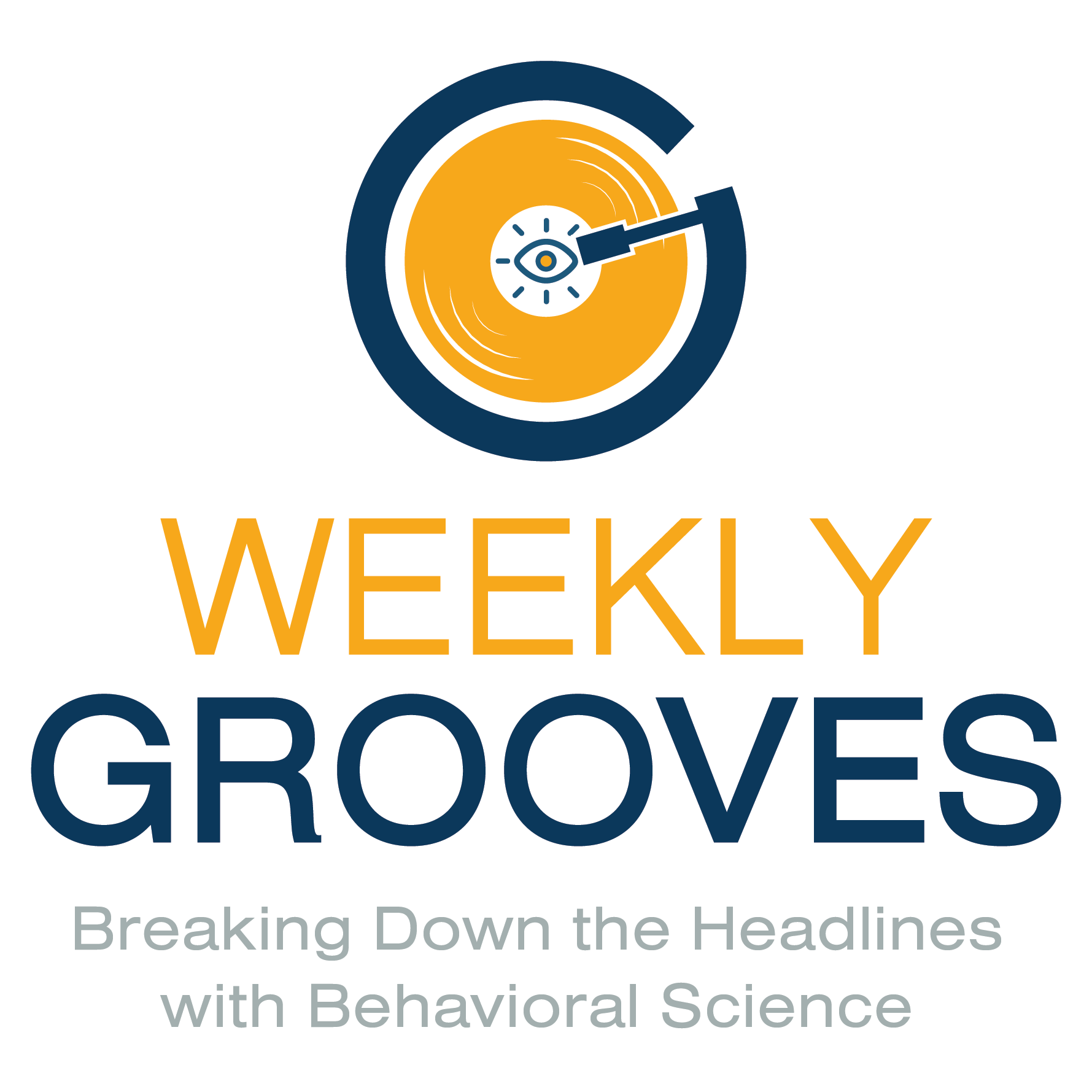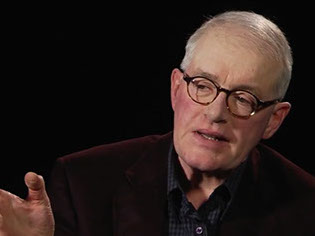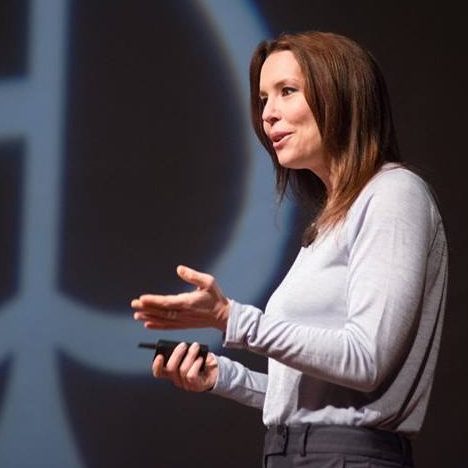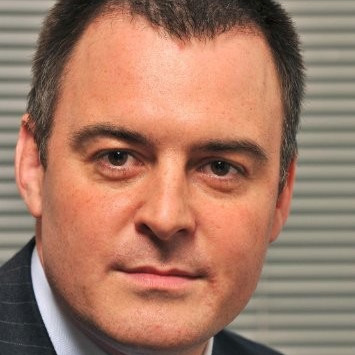Shows

NeuroFlex PodcastNFX #108: Applied Behavioral Science w/ Kurt NelsonRecognized as one of the leading applied behavioral scientists in the country, Kurt brings his expertise in understanding human motivation to help your listeners understand how they can influence and drive positive behavior change. He is the co-host of two podcasts on positively applying behavioral science to life and work: Behavioral Grooves (a Chartible's top-20 global social science podcast) and Weekly Grooves.Kurt's ability to take scientific research and make it easy to understand and apply in the real world makes him a great guest for your listeners. His easy-going and fun demeanor ma...
2021-04-2552 min
Fruitful ConversationsEpisode 19 - Tim Houlihan - Behavioural GroovingTim Houlihan is the guy you want to be seated next to at a dinner party. The sort of man you can talk to for a long time about a lot of things. So when I saw him described as a thirsty explorer with a passion for applying knowledge to improving life, well, I had to have him on the show.Tim is not only a talented singer/songwriter, but the founder of BehaviorAlchemy, and co host on the excellent podcast Behavioral Grooves, where loads of smart guests are invited to explain why we do w...
2021-01-2149 min
Weekly GroovesThe Art of Communicating RiskThis week we look at how we communicate risk and uncertainty. In an article from Harvard Business Review titled, “The Art of Communicating Risk” by Anne Cleaveland, Cussins Newman, and Steven Weber, the authors outline how communicating risk, particularly uncertain risk, is at the very least, difficult.Sometimes, the recipients of the message are underestimated; however, we are actually pretty good at coping with “straightforward bad news.” Our communication style and frequency matter the most when we face uncertainty, especially in situations where we can’t tell how bad something might be.The article identifies a common di...
2020-10-1715 min
Weekly GroovesImprove Productivity by Making Your Workforce Psychologically SafeWe were inspired by a recent article on CNBC’s website by Cory Steig, called “ 'Psychological safety’ at work improves productivity–here are 4 ways to get it, according to a Harvard expert.” The piece reviews some research on psychology safety that Kurt and I have been focused on for years.Psychological safety is a concept that was identified by Harvard Professor Amy Edmondson from work in the 1990’s. Professor Edmondson defines psychological safety as “a workplace where one feels that one’s voice is welcome with bad news, questions, concerns, half-baked ideas and even mistakes.” One way we experience this...
2020-10-0916 min
Weekly GroovesThe Single Largest Driver of Coronavirus MisinformationSheryl Gay Stolberg and Noah Weiland of The New York Times wrote an article titled, “Study Finds ‘Single Largest Driver’ of Coronavirus Misinformation: Trump.” The article is based on research from the Cornell Alliance for Science that analyzed over 38 million articles around the world on the pandemic. They found that “Mentions of Trump made up nearly 38% of the overall “misinformation conversation,” making the president the largest driver of the “infodemic.”Of the 38 million articles on the pandemic, 1.1 million of them “disseminated, amplified or reported on misinformation related to the pandemic.” The study found 11 topics of misinformation that were prevalent in these...
2020-10-0318 min
Weekly GroovesIf You Want To Get Ahead FAST, Don’t Be A JerkThis week’s groove comes from an article by Laura Counts from the University of California at Berkley, where she reported on some research by Berkeley Haas professor, Cameron Anderson. Professor Anderson’s research points out that being a jerk, while it might get you some immediate gains, in the long run is a bad strategy. In two longitudinal studies that Anderson and his colleagues conducted, they found that “disagreeable individuals did not attain higher power” relative to others. This flies in the face of some commonly held beliefs, but this belief stems from availability bias, wher...
2020-09-2500 min
Weekly GroovesColleges and the CoronavirusWe got a call recently from Eugen Dimant, a friend of ours who is an associate professor in behavioral and decision sciences at the University of Pennsylvania, about how the University of Michigan was trying to let students know that they should only gather in groups of 25 of less.Eugen suggested we tee it up as a topical issue for Weekly Grooves and we readily agreed. It led to a discussion about what colleges are doing to regulate student activites to contain the coronavirus, the punishments involved in breaking those regulations, the environment in which students make...
2020-09-2000 min
Weekly GroovesRedefining Old AgeNathan Yau, the head of the FlowingData.com blog site, wrote a piece called “Redefining Old Age” where he explores our changing definition and understanding of what it means to be old. The article starts by looking at various definitions of old age and reminds the reader that the average person’s life expectancy has dramatically increased since the 1930s. Kurt and Tim dissect this topic through a behavioral science lens wondering how old age gets redefined when (a) we live so much longer and (b) the psychological and social implications are so different today than they were eve...
2020-09-0400 min
Weekly GroovesRomance and Politics: How to Keep Your Love Alive with Political DifferencesThis week we were inspired by an article in The New York Times by Nicole Pajer called “Can Love Survive This Election?” Nicole’s article confirmed our sneaking suspicions about how romantic relationships may be suffering in the current political climate. She points out how divorces due to political affiliation are on the rise and reports that people using dating sites are searching on political affiliation of potential partners – now more than ever.So, we decided to look more closely at the topic through a behavioral science lens.One of our first questions was about whether...
2020-08-2900 min
Weekly GroovesWhat Do Lions, Cow Butts with Painted Eyes and Human Decision Making Have in Common?This week we were inspired by Robby Berman’s article on Big Think.com called “Eyes painted on cow butt’s thwart lion attacks.” It got us thinking about how humans put together stories from things that don’t make sense – just like lions.The article is about how lions don’t prey on cattle when the cattle have eyes painted on their butts. Lions are what are called ambush predators. That means they want the easiest kills possible. They want to come up on an unsuspecting animal and pounce it quickly…and they won’t do that if the animal...
2020-08-2200 min
Weekly Grooves3 Reasons Why Dolly Parton is So Likeable3 Reasons Why Dolly Parton is So LikeableToday we saw an article in Billboard Magazine by Melinda Newman titled, “Dolly Parton: Steers her Empire Through the Pandemic – and Keeps it Grooving.” Yes, putting “grooving” in the title made it appealing, but the general fascination with Dolly caused us to investigate more deeply.What we found is what millions of people already know: Dolly Parton is frickin amazing! Looking back at her 50 years of work –as a singer, actress, and entrepreneur – you get a sense of how amazing she is with all the success in a diverse line of...
2020-08-1500 min
Weekly GroovesTo Move Fast, Slow Down: 3 Tips to Make Better Decisions in 15 MinutesThis week we were inspired by an article by Minda Zetlin on Inc.’s webpage titled, “Need to make a difficult decision fast? Take 15 minutes and do this first.”The article outlines tips on how to slow down prior to making a key decision in order to improve the quality of the decision you’re making. The basic idea is to move fast, we need to slow down.In the article, Ms. Zetlin shares how we, particularly in this time of COVID, are dealing with a lot of tough decisions. This causes stress and can potential...
2020-08-0700 min
Weekly GroovesChanges in How We WorkThis week we explore a recent article published in Harvard Business Review’s “The Big Idea” section titled, “Microsoft analyzed data on its newly remote workforce.” It’s written by Natalie Signer-Velush, Kevin Sherman and Erik Anderson and it compares 4-months of anonymized data from 350-plus Microsoft employees during the pandemic to the same metrics prior to the work-from-home orders. Kurt and Tim discuss the findings and then try to decipher “why” those changes occurred via the behavioral and psychological inputs and outputs that may have been at play. Some of the findings are co...
2020-07-2600 min
Weekly GroovesThe Demographic and Psychological Aspects of Mask WearingMegan Brenan, a research consultant at Gallup, published an article on July 13, 2020, about data collected in a recent Gallup Poll. Her article is titled, “Americans’ Face Mask Usage Varies Greatly by Demographics.” We were intrigued because every demographic breakdown comes with some psychological components.Facemask use in public helps to stop the spread of coronavirus, according to the latest scientific sources. However, wearing a mask has become politized beyond the facts. Brenan’s article took an in-depth look at the demographic breakdown of usage of masks and we wanted to discuss the potential psychological issues associated with them.
2020-07-1700 min
Behavioral Grooves PodcastCovid-19 Crisis: Caroline Webb, Senior Advisor at McKinsey, on The Value of Where We Place Our Attention and Amplifying CertaintyCaroline Webb, a Senior Advisor at McKinsey, is an executive coach, author, and speaker specializing in insights from behavioral science to improve our lives at work. Her book on that topic, How To Have A Good Day, has been published in 14 languages and in more than 60 countries. One of her past jobs was to contribute to the world economic forecast, and she is fluid in her ability to speak with authority on a wide spectrum of topics. This session was recorded in February 2020 in the early days of the lockdown and we realize Caroline's words of encouragement to identify e...
2020-07-0554 min
Behavioral Grooves PodcastCovid-19 Crisis: Margaret Robinson Rutherford, PhD on Perfectly Hidden DepressionMargaret Robinson Rutherford, PhD, is a clinical psychologist in private practice with more than twenty-five years of experience treating individuals and couples for depression, anxiety, and relationship issues.
She also offers her compassionate and commonsense therapeutic style to the general public through her popular blog and podcasts, with the goal of decreasing the stigma around psychological treatment. Her podcasts and shows on perfectly hidden depression (PHD) have reached thousands, as she sheds light on this overlooked presentation of the disease.
She is also the author of PERFECTLY HIDDEN DEPRESSION: How to Break Free from the P...
2020-06-281h 08
Weekly GroovesUsing Diversity to Bring a New Lens to Old ProblemsThis week, Tim found an article published by the American Economic Association with Harvard professor Mario Small, PhD called “Rethinking racial discrimination: how sociology can help economics diversify its perspective.”The article explores how – with only 3% of economists identifying as black in a recent AEA survey – economists are lacking a diverse perspective. Dr. Small argues this inhibits creativity and innovation in the field of economics and is particularly true as it relates to how racial discrimination is studied in economics.He argues that economics could learn from sociology in the way the field embraces different perspecti...
2020-06-2700 min
Weekly GroovesIf You Can Work from Anywhere, Where Will You Live?We saw an article in the Wall Street Journal titled “When Workers Can Live Anywhere, Many Ask: Why Do I Live Here?” and it got us thinking. Millions of white-collar workers have been displaced from their offices and are being told they are on indefinite work-from-home status. And many of those workers are opting to leave the big cities where the virus has been most aggressive.In addition to the temporary exodus to more rural settings, some people are leaving big cities to find permanent solace in the countryside.This got us thinking about how huma...
2020-06-1900 min
Weekly GroovesHow Riot Art Creates HopeWe were pleased when we saw an article this week in the Minneapolis Star Tribune, by Alicia Eler titled, “George Floyd Murals, Graffiti on Boarded-Up Twin Cities Businesses Spread a Message of Pain — and Hope.” The author states, “In the wake of last week’s riots, hundreds of artists around the city are transforming boarded-up windows with messages of remembrance, hope, demands for justice, healing community and pride for minority-owned businesses.”We wanted to explore this idea of graffiti art in situations like the one we’re in right now – not only as a way of expressing emotions but of cre...
2020-06-1200 min
Behavioral Grooves PodcastCovid-19 Crisis: Howard Friedman, PhD on The Value of Human LifeHoward Friedman is a data scientist, health economist, and writer with decades of experience in both the private and public sectors, as well as academia. He is widely known for his work as a statistical modeler and he currently lives in New York City and teaches at Columbia University.
Howard's new book, Ultimate Price: The Value We Place on Life, is about how the monetary values assigned to our lives by governments, medical professionals, and insurers can determine who will survive during times of crisis.
We talked to Howard about different models for the valuation of...
2020-06-0753 min
Weekly GroovesReflecting on Protests Sparked by the Death of George Floyd in MinneapolisOn May 25, 2020, a white Minneapolis police officer killed George Floyd, an unarmed black man, by holding him down with a knee on his neck for over 8 minutes. This was done while three other officers either helped in holding down Mr. Floyd down or stood by watching. Mr. Floyd’s death is an unimaginable horror as it was not the result of a split-second or hair-trigger decision, but a callous, calculated effort that lasted more than 8 minutes. This killing kicked off a week of protests which grew darker as the nights went on. As many as 81 buildi...
2020-06-0500 min
Behavioral Grooves PodcastCovid-19 Crisis: Chris Pfeiffer on Tips for Adjusting Sales Comp PlansChris Pfeiffer is a Senior Business Analyst at Tegra Analytics. Chris specializes in salesforce effectiveness in the life science industry, which includes incentive compensation, targeting and segmentation, sales force sizing and optimization, statistical analysis, and business intelligence.
Chris graduated from The Johns Hopkins University, where he received his Master of Science in Government Analytics, and La Salle University, where he received his Bachelor of Science in Business Administration (major in Finance with a minor in Economics).
We spoke to Chris about some of the challenges brought on by the coronavirus crisis. We discussed sales quotas an...
2020-06-0346 min
Weekly GroovesReopening Your Business with an Emotional BootcampJoseph Grenny penned an article on May 20th in HBR.com called “5 Tips for Safely Reopening Your Office.” It tapped into something we have been thinking about recently: What can be done to help people get back to work…safely?Grenny’s work adds to a growing library of articles about how companies can reopen by focusing on structural and process components. Many articles speak to the importance of taking people’s temperatures before they enter the building, creating physical distancing cues or structural changes in the office, protocols for what happens if someone does come down with COVID...
2020-05-3000 min
Behavioral Grooves PodcastCovid-19 Crisis: Claire Bidwell Smith on Grief During the CrisisClaire Bidwell Smith is a licensed therapist specializing in grief and the author of three books of nonfiction, most recently ANXIETY: The Missing Stage of Grief. She has written for The New York Times, The Washington Post, The Guardian, and a variety of other publications.
She received her Master’s Degree in clinical psychology from Antioch University, and has recently transitioned her therapeutic practice to the East Coast of the United States while working with clients around the globe.
Our discussion with Claire focused on how a crisis is unique in its ability to generate grief...
2020-05-2746 min
Behavioral Grooves PodcastCovid-19 Crisis: Kristen Berman on Remote Work, Quaranteams and MarinadesKristen Berman is the co-founder of Irrational Labs and co-founder and principal at Common Cents Lab, a non-profit behavioral consulting company, with Dan Ariely. They work focuses on the financial well-being of low-to-middle-income Americans.
She was also on the founding team for the behavioral economics group at Google and hosts one of the top behavioral change conferences globally, StartupOnomics. She co-authored a series of workbooks (with Dan Ariely) called Hacking Human Nature for Good: A Practical Guide to Changing Behavior.
Our conversation with Kristen began with some straightforward tips on boosting productivity while working in i...
2020-05-2444 min
Weekly GroovesSuggestions for How To Deal with Quarantine FatigueThis week, we saw an op-ed piece in Elemental Medium called, “Quarantine Fatigue is overtaking us. We could have done better.” It was written by Gabe Zichermann and he outlined a few of the human hardships that have manifested themselves in quarantine. The fatigue factor that accompanies them is real and worthy of exploration. However, thought the author went farther and offered a bit of controversial advice – if we get a do-over – on how we should have handled it. Zichermann lays out three contributors to fatigue and makes some recommendations for what should have happened, or as he calls i...
2020-05-2200 min
Behavioral Grooves PodcastCovid-19 Crisis: Stephen Curtis on Neuroplasticity and Creating the IdealStephen Curtis, PhD is a Clinical Psychologist with a doctorate in Neuroscience Experimental Psychology. He specializes in Performance Psychology with professional and college athletes, musicians, and corporate leaders to help them reach their highest levels of performance.
Steve is the author of the proprietary Clarity Survey which has become a business research best practice instrument with Fortune 500 companies. Clarity uses common language answers to detect what consumers and employees consider their ideal CX and EX experiences, and in so doing, it offers tremendous insights for business leaders.
In this episode, we focused on the ways in...
2020-05-1958 min
Weekly GroovesLosing Your Job Might Cause You to Save MoreThis week, Matt Egan in CNN Business wrote a piece called “Americans create new economic threat with their own savings.” In it, he wrote that credit card debt is declining as American’s are spending less AND are paying down their balances.This information piled on top of a conversation we had on our other podcast, Behavioral Grooves, with Mariel Beasley, the Director of the Center for Advanced Hindsight at Duke University. She shared current research that lower-to-middle income Americans are saving MORE during the pandemic.On one hand, that’s totally rational because we don’t kn...
2020-05-1500 min
Behavioral Grooves PodcastCovid-19 Crisis: Mariel Beasley on Increasing Short Term Savings During the CrisisMariel Beasley is the Co-Director of the Common Cents Lab at the Center for Advanced Hindsight at Duke University. She works on applications of behavioral research, primarily in the financial services sector and public policy arena. She holds a Master of Public Policy degree from Duke University and her previous work experience includes a variety of nonprofits and charitable foundations.
As the leader of Common Cents Lab, she often develops partnerships with financial institutions to put behavioral science to good use through improving products, services and experiences for low-to-moderate households.
We talked to Ma...
2020-05-131h 05
Weekly GroovesCommunicating Through a PandemicCharles Duhigg, one of our favorite authors on habits, wrote an article for The New Yorker called, “Seattle’s Leaders Let Scientists Take the Lead, New York’s Did Not.” The article explores how the two cities differed in their response and how the results were tragically different. While Dughigg covers a lot of ground, and the article is fascinating, we want to explore a couple of key concepts out if it as it relates to communication.In the article, there is a reference to the CDC’s (Center for Disease Control) field manual on managing a crisis. In...
2020-05-0800 min
Behavioral Grooves PodcastCovid-19 Crisis: Kaveh Yasdifard on Uniting Innovators from TehranKaveh Yazdifard is the Chief Innovation Officer at Sahab Pardaz located in Tehran, Iran. He is also the Director of Urban Innovation for the city and COO of Avatech Accelerator, a firm focused on empowering business startups through a values-driven culture.
While much of Kaveh’s work is focused on collaborating and creating value through Innovation, we were particularly interested in speaking with him about the way he applies Cognitive Psychology and Data Science to his work.
And at this writing, Kaveh and his teams are developing initiatives in Iran to help individuals and businesses surv...
2020-05-0552 min
Behavioral Grooves PodcastCovid-19 Crisis: Gretchen Chapman, PhD on The Psychology of VaccinationsGretchen Chapman, PhD researches how we make decisions about vaccines. She is a Professor in the Social & Decision Sciences department at Carnegie Mellon University and works across disciplines in both fields of judgment and decision making as well as health psychology.
She is the recipient of an APA early career award and an NJ Psychological Association Distinguished Research Award, a fellow of APA and APS. She is a former senior editor at Psychological Science, a past president of the Society for Judgment & Decision Making, the author of more than 100 journal articles, and the recipient of 20 years of c...
2020-05-0357 min
Behavioral Grooves PodcastCovid-19 Crisis: Jules Nolan on The Kids are Alright - Insights on Coping Through the CrisisJules Nolan, PhD is a psychologist, speaker, and author. She is the president of the Minnesota School Psychology Association and chairwoman for the Human Diversity Committee for the International School Psychology Association.
Her research, which has been conducted and published internationally, focuses on behavior, achievement, and wellbeing for school-aged children. She consults with parents and educators on how to manage family life and classrooms to help all children thrive.
We talked to Jules to get her thoughts into how she assists families with the unfamiliar experience of being together constantly. Jules delivered insightful comments, terrific re...
2020-05-011h 10
Behavioral Grooves PodcastCovid-19 Crisis: Greg Davies, PhD on the Fetish of OptimizationGreg Davies, PhD is a specialist in applied behavioral finance, decision science, impact investing, and financial wellbeing. He founded the banking world’s first behavioral finance team at Barclays in 2006, which he led for a decade. In 2017 he joined Oxford Risk to lead the development of behavioral decision support software to help people make the best possible financial decisions.
Greg holds a PhD in Behavioural Decision Theory from Cambridge; he has held academic affiliations at UCL, Imperial College, and Oxford; and is author of Behavioral Investment Management. Greg is also Chair of Sound and Music, the UK’s na...
2020-04-281h 20
Weekly GroovesThanks For No MemoriesOur inspiration this week comes from an article written by Shayla Love for Vice titled, “You’ll probably forget what it was like to live through a pandemic.” We thought it would make a great jumping-off point for how we will remember this time as well as a discussion on memory in general. We explore how memories get shaped during historically significant times and how vividness and emotion play into those memories. But, as Shayla notes, we don’t remember things all that accurately.She points out that our specific memory of this time, even with all...
2020-04-2500 min
Behavioral Grooves PodcastCovid-19 Crisis: Anurag Vaish on Risk is a Feeling, Not a NumberAnurag Vaish is the co-founder and director of The FinalMile in Mumbai, India. In building the company's practice of Behavior Architecture, Anurag led the conceptualization and development of digital games as a platform for research.
Anurag brings over 17 years of experience in strategic planning, research and marketing communication. Our conversation with him allowed him to highlight some of the work FinalMile is doing with the Indian government.
More importantly, Anurag and his team are building a Pandemic Playbook (link below) which is an archive of data points, interventions, communication, trends in activities and observations and...
2020-04-2046 min
Weekly GroovesTips for Maintaining Social Relationships in During COVID-19This week, we saw an article in NewScientist titled, “Psychology tips for maintaining social relationships during the lockdown.” For those of you who haven’t seen it, we thought it would be valuable to review that and other tips on staying sane during a shelter-in-place order.In this episode, Kurt and Tim look at hints and tips to stay more socially connected while needing to be physically distant.The article that got us excited about this topic was written by Robin Dunbar, PhD, a British anthropologist, evolutionary psychologist and an expert in social bonding. Dr. Dunbar...
2020-04-1800 min
Behavioral Grooves PodcastCovid-19 Crisis: Michael Boden on How Field Sales Reps Are Adapting to the CrisisMichael Boden is the Head of U.S. Crop Protection Sales at Syngenta, a global agrochemicals and seeds firm based in Basel, Switzerland. He joined the company in 1986 and has held global sales and marketing positions throughout his career. Michael grew up in Sioux City, Iowa, and is currently based in Syngenta’s North American headquarters in Greensboro, North Carolina.
Michael shared a vivid image of his business: it’s what he calls belly-to-belly relationships his reps and agronomists have with growers (farmers), retailers and distributors. He also shared an insight about the need for corporate redundancy that...
2020-04-1737 min
Behavioral Grooves PodcastCovid-19 Crisis: Alessandro del Ponte on Moral Dilemmas with Economic ConsequencesAlessandro del Ponte is a research fellow at the National University of Singapore working in the Behavioral Change program at the Global Asia Institute. He recently earned his PhD in behavioral political economy from Stony Brook University in New York. His recent research uses simple video games to understand how people feel about making tradeoffs between jobs and paying off national debt, or between saving lives in the national healthcare system or paying off the national debt.
We decided to connect with Alessandro because of President Trump’s recent comment: The cure shouldn’t be worse than the...
2020-04-1441 min
Behavioral Grooves PodcastCovid-19 Crisis: Cristina Bicchieri – Messaging Rules For Improving Social BehaviorCristina Bicchieri, PhD is the S. J. Patterson Harvie Professor of Social Thought and Comparative Ethics, a Professor of Philosophy and Psychology at the University of Pennsylvania, a Professor of Legal Studies at the Wharton School, the Head of the Behavioral Ethics Lab, the Director of the Philosophy, Politics, and Economics Program, and is the Faculty Director of the Master of Behavioral and Decision Sciences Program at the University of Pennsylvania. Her research with UNICEF keeps her busy around the world, as well.
Our discussion with Cristina offers more than just a few tips (noted below). Cristina’s o...
2020-04-111h 18
Weekly GroovesWhy No One is Reading Your Coronavirus EmailsTodd Rogers, PhD, wrote an editorial piece for CNN called “Why is No One Reading Your Coronavirus Emails,” and we can’t really get it out of our heads. Todd is a professor of public policy at Harvard University and chief scientist at EveryDay Labs, a behavioral science company focused on parent communication in education. We instantly appreciated that he’s looking at the problem of too damn many coronavirus emails through a scholarly, and behavioral, lens.In this episode, we groove on the behavioral aspects of these emails: the senders and the receivers. We see retailers succumbi...
2020-04-1000 min
Weekly GroovesEconomic Optimism in America – Really?This week, we saw a survey conducted by McKinsey about consumer sentiments during the crisis across several different countries, generations and economic statuses. The comparative data is fascinating and we wanted to view it through a behavioral lens.Although businesses may eventually come back to life after social distancing measures lift, it won’t happen all at once. It is also unlikely that consumer spending, the largest contributor to US economic activity, will bounce back immediately. Part of that is due to a decline in incomes, especially for workers who have been furloughed or laid off....
2020-04-0300 min
Behavioral Grooves PodcastCovid-19 Crisis: Aline Holzwarth on Our Behavioral Immune SystemAline Holzwarth is the head of Behavioral Science at Pattern Health in Durham, North Carolina and a writer who supplies work to Behavioral Scientist and Forbes and has well as her blog on Medium. And she is also Principal of Dan Ariely’s Center for Advanced Hindsight, where she is responsible for directing the strategy, operations and communications for the Duke University research center.
Our conversation with Aline was relaxed and built on the underpinnings of abundance and gratitude. We talked first about some the great tips she offers for handwashing messages and how our behavioral immune sy...
2020-04-0347 min
Behavioral Grooves PodcastCovid-19 Crisis: Brad Shuck, PhD on Pausing, Building Capacity and "Not Business as Usual"Brad Shuck, PhD is an Associate Professor in the Department of Educational Leadership, Evaluation and Organizational Development at the University of Louisville. He is also the Program Director of the Center for Human Resource and Organizational Development. Brad has been researching employee engagement for many years and is a featured speaker at conferences on employee engagement around the world.
Talking to Brad was like having a friendly counselor talk you off the ledge while we covered meaningful topics starting with the fact that this is definitely NOT business as usual. His take on intentionality, deliberate action and...
2020-04-021h 06
Behavioral Grooves PodcastCovid-19 Crisis: Eugen Dimant, PhD on the Roles of Social Norms and Good ScienceEugen Dimant, PhD is an Associate Professor of Practice in Behavioral and Decision Sciences, which is part of the new Center for Social Norms and Behavioral Dynamics under Cristina Bicchieri, Ph.D.’s leadership at the University of Pennsylvania. Much of his work is focused on how social norms are formed and impact our lives.
We talked about how social norms drive individual behaviors in different ways and how research on coronavirus-related behaviors is being completed at record speeds – but not necessarily all in good ways. He recommends slowing down, working across disciplines, and being clear on rese...
2020-03-3148 min
Behavioral Grooves PodcastCovid-19 Crisis: Wendy Wood, PhD on Habits, Productivity and Being Gentle with YourselfWendy Wood, PhD is a social psychologist whose research addresses the ways that habits guide behavior. She researches and teaches at USC both in psychology and in the business school and is a world-renowned expert on breaking old habits and creating new ones. Her book, “Good Habits, Bad Habits” is a New York Times bestseller and delivers a terrifically readable and scholarly approach to habits.
In our conversation with her, she shared what habits are and how habits get formed. We talked about how now could be a time for more pro-social behavior. And she reminded us to b...
2020-03-3039 min
Behavioral Grooves PodcastCovid-19 Crisis: Rodd Wagner on The Zen of Staying SafeRodd Wagner is a Forbes columnist and bestselling author of books on leadership, employee engagement and collaboration. Rodd’s books have been published in 10 languages and his articles have appeared in The Wall Street Journal, Harvard Business Review, Fast Company, USA Today, ABC News, as well as Globe and Mail in Canada. One of his books was even parodied in Dilbert.
In our conversation, we discussed how humans perceive risk, regulation (by the self and by the government), and cumulative probabilities. We’ve known Rodd for many years and always find his perspectives fresh and ripe with curi...
2020-03-2859 min
Weekly GroovesThe Impact of Celebrity DonationsCelebrities making big donations are nothing new. But in the crisis-ridden days of our coronavirus quarantines, celebrity donations seem to be piling up. Good news for the charities – right? That’s why we were attracted to an article in The Hill about large celebrity donations intended to assist with the pandemic. Judy Kurtz’s story is about singer James Taylor and his wife Kim giving $1 million to Massachusetts General Hospital to assist with purchasing supplies and equipment, repurposing space, or furthering research seeking treatments and means of prevention for COVID-19. Ms. Kurtz identified a few things that caught...
2020-03-2700 min
Behavioral Grooves PodcastCovid-19 Crisis: Annie Duke on Hedging and the Last Disaster SyndromeAnnie Duke is an author, corporate speaker, and consultant in the decision-making space. Her most recent book, Thinking in Bets: Making Smarter Decisions When You Don’t Have All the Facts, quickly became a national bestseller and landed on the Behavioral Grooves Top 10 list for 2018!
Prior to her career as a professional poker player, Annie was awarded a National Science Foundation Fellowship to study Cognitive Psychology at the University of Pennsylvania. She is the co-founder of The Alliance for Decision Education, a non-profit whose mission to improve lives by empowering students through decision skills education.
And...
2020-03-271h 17
Behavioral Grooves PodcastCovid-19 Crisis: Ali Fenwick, PhD on Leveraging the Crisis for GoodAli Fenwick, PhD is a Professor of Organizational Behavior at Hult International Business School in London and Dubai. He specializes in applying behavioural traits and behavioral interventions for business improvement, government policy design, communication effectiveness and, among other things, psychographic profiling.
According to Ali, “Bulk buying is caused by various psychological and environmental cues which throw rational-thinking out of the window. When in survival mode, we let mainly our emotions drive decisions and are more susceptible to social influences. So, we will rush out and buy more because we believe others are doing the same.”
We dis...
2020-03-251h 01
Behavioral Grooves PodcastCovid-19 Crisis: James Brewer on Changing His MindJames Brewer is the Director of Marketing Platforms and Global Customer Operations for Eli Lilly and Company. Over the years, Kurt and Tim have worked with James on applying behavioral science insights to his work, and many of his colleagues’ work, at Eli Lilly. James is an avid behavioral science practitioner and also a friend.
We started our discussion with James about how his views have shifted from being someone who thought the media was overhyping the pandemic, to being someone who is taking the threat from the coronavirus very seriously. This naturally integrated James’s personal story...
2020-03-2459 min
Behavioral Grooves PodcastCovid-19 Crisis: Don’t Outsource Your Critical Thinking with Christian HuntChristian Hunt is the founder of Human Risk, a Behavioral Science consulting and training firm specializing in risk, compliance, conduct & culture. Previously, Christian was the head of Behavioral Science at UBS and Chief Operating Officer of the Prudential Regulation Authority. He is an expert on risk and how people perceive risk.
We wanted to talk to Christian about how we perceive risk and whether or not our human biases are overblowing (or undervaluing) the current pandemic. We also chatted about a concept introduced to us by Deborah Small, a professor at Wharton, called distorted risk perception.
...
2020-03-2358 min
Behavioral Grooves PodcastCovid-19 Crisis: Barry Ritholtz on Keeping PerspectiveBarry Ritholtz is the CIO of Ritholtz Wealth Management and the host of the Bloomberg podcast Masters in Business, where he talks almost as much about markets, investing and business as he does about the behavioral science behind WHY we do what we do. Our first conversation appears in the ever-popular Episode 47.
This week, we discussed the financial implications of the financial crisis resulting from the pandemic. It’s not, as Barry notes quite clearly, a one hundred year flood. The market is reacting the way it normally does. While the shifts are dramatic, they were unforeseen an...
2020-03-2256 min
Behavioral Grooves PodcastCovid-19 Crisis: Emotional Impact of WFH with Liz FosslienLiz Fosslien was our guest on Episode 56 and we asked her back to kick off our series on the behavioral aspects of how life is changing with quarantines, sheltering in place and working from home. Liz is the Head of Content at HUMU, a firm that combines people science and machine learning to create breakthroughs on a wide variety of people-centric measurements. Liz is also the co-author and illustrator of No Hard Feelings: The Secret Power of Embracing Emotions at Work.
We discussed how this crisis has impacted our emotional wellbeing and how to get along while wo...
2020-03-2145 min
Weekly GroovesOut of Toilet Paper? Blame America's Failings in the Toilet WarsKurt was struck by an article on the National Public Radio site that indicated the United States is significantly behind the rest of the civilized world when it comes to modernized toileting. That caused us to take a closer look at the behavioral science behind what’s keeping the US market from adopting higher tech versions of the porcelain throne.With toilet paper flying off the shelves, one wonders WHY more Americans aren't scooping up bidets. (In fact, they are starting to. Tushy said their sales are up 50% since the outbreak of the coronavirus.)We ar...
2020-03-2000 min
Weekly GroovesManipulated Media – Do Labels Matter?This week, Twitter created a new policy and applied it to an edited video of Joe Biden that a White House official posted, and of course, President Trump retweeted. The material was not original – it had been tampered with. The video triggered Twitter to create a new policy banning the use of synthetic or manipulated media. In other words, videos that were not original would be in violation.Twitter has faced push-back from activists citing First Amendment rights and the difficulty in identifying what is “fake” versus what isn’t. Their policy reads:“You may not decepti...
2020-03-1300 min
Weekly GroovesHacking the Coronavirus and Covid-19Coronavirus and the disease it’s created – Covid-19 – is alive and well and getting stronger every day. How bad is it? It’s difficult to say with any certainty in part because it’s constantly changing and it’s very complex. However, when presented with ambiguous information, our minds draw conclusions based on our biases and the decision-making heuristics our ancient brains rely on.In this episode, Kurt and Tim discuss an article by friend and leading behavioral scientist, Michael Hallsworth, PhD. Michael leads the North American Behavioural Insights Team and knows a thing or two about behavior cha...
2020-03-1000 min
Weekly GroovesDonation BurnoutYou’re probably familiar with the dreaded Membership Drive from non-profit organizations around the world. Whichever season it is, there seems to be a membership drive going on. In Minneapolis, where we live, the Winter Membership Drive from National Public Radio has been going on and it’s driving us crazy.In this episode of Weekly Grooves, we explore the irritation that donors have for being asked to give more and more frequently. And not only membership and donation drives, but why we get burned out on charitable giving across the board. It’s not that we...
2020-03-0900 min
Weekly GroovesGarbage Language & Corporate Double Talk: The Downside..and Upside?Corporate speak. Garbage language. Double talk. Acronyms. We are fed up with language that lacks clarity and is intended to obfuscate. We were instantly happy when we saw an article in Vulture by Molly Young that got us thinking: among all the detestable aspects of this double talk, is it possible there’s an upside, too?In this episode of Weekly Grooves, we explore some of the psychological benefits and attenuations caused by what is often referred to as Garbage Language. In just a few short minutes, we run through some of our most irritating examples of th...
2020-02-2800 min
Weekly GroovesReclining Airline Seats – Whose Space Is It Anyway?How do you deal with someone reclining their airline seat while you’re trying to read? And how do you deal with someone behind you who doesn’t want you to decline your seat? This very small encounter can create heated exchanges, as seen in the video links below.The resolution could be very simple when viewed through a behavioral lens. The first question is about ownership: who owns the space – the person wanting to recline or the person wanting to read?In this week’s episode, we apply the behavioral lens to a situation that need...
2020-02-2200 min
Weekly GroovesHow Do We Deal with Disinformation?We saw an article in The Atlantic that caught our attention because of its hook into behavioral science: our willingness to believe disinformation. In this week’s episode, we talk about the underlying behavioral science into why we humans are so susceptible to information that is not accurate.What can we do? We can use the OODA loop to interrupt our too-quick decision to simply accept suspicious content: Observe – Orient – Decide – Act. The OODA loop, in a very simplistic manner, uses these four elements in this way: to take in and observe the context in which you’re seeing...
2020-02-1400 min
Weekly GroovesIowa Caucus Conspiracy Theories – How to Inoculate YourselfListeners, especially in the United States, are already aware of the debacle from the Iowa Caucuses and how the Iowa Democratic party used a new app to help streamline the caucus results. You’re probably also aware that the processes and technologies failed, and results were not available for days afterward.The delay has caused a plethora of online conspiracy theories and that’s our topic for this week. In the absence of good data, we make it up.Some of the richest conspiracy theories Kurt and Tim found include: 1.) The Democratic party didn’t like t...
2020-02-0700 min
Weekly GroovesThe Iowa Caucuses - Do They Matter?Weekly Grooves is the podcast where we explore topical issues through the lens of behavioral science. Tim Houlihan and Kurt Nelson, PhD have worked in the world of behavioral interventions for more than 20 years and we each run our own consultancies. In Weekly Grooves, we view the headlines through the lenses of behavioral science.The Iowa caucuses are on February 3, 2020, and the media is abuzz with who will win Iowa and take the “front runner lead” for the Democrats. So while we’re interested in the politics of this, we’re actually more interested in the psychology of being...
2020-01-3100 min
Weekly GroovesHow Will We Remember Kobe BryantWeekly Grooves is the podcast where we explore topical issues through the lens of behavioral science. Tim Houlihan and Kurt Nelson, PhD have worked in the world of behavioral interventions for more than 20 years and we each run our own consultancies. In Weekly Grooves, we view the headlines through the lenses of behavioral science.This week, we were struck by the way people were talking about Kobe Bryant after his sudden death in a helicopter crash in which he and eight other people perished, including his 13-year old daughter, Gianna. Kobe was only 41 years old....
2020-01-3100 min
Weekly GroovesHow To Keep Your Keep Your New Year's ResolutionsThis is Weekly Grooves' inaugural episode where we explore topical issues through the lens of behavioral science. Tim Houlihan and Kurt Nelson, PhD have worked in the world of behavioral interventions for more than 20 years and we each run our own consultancies. In Weekly Grooves, we view the headlines through the lenses of behavioral science.We are not good at keeping resolutions. January 17th is the Ditch New Year’s Resolutions Day – the day that it is attributed with having the most people abandoned their New Year’s resolutions. It is often a day of celebration, and among...
2020-01-3100 min